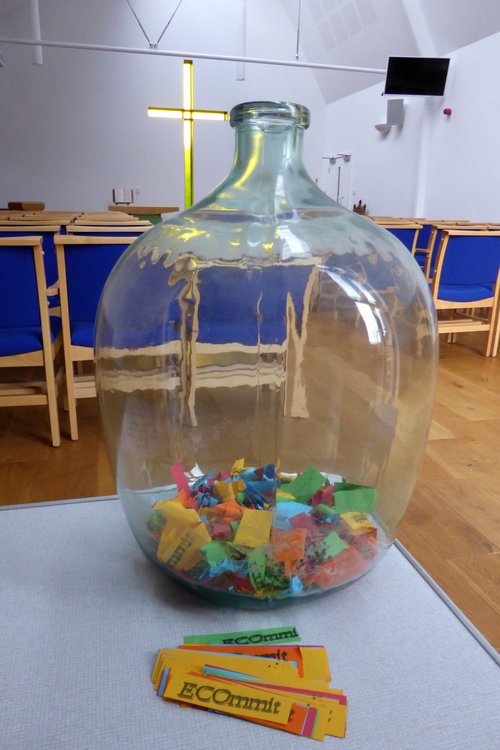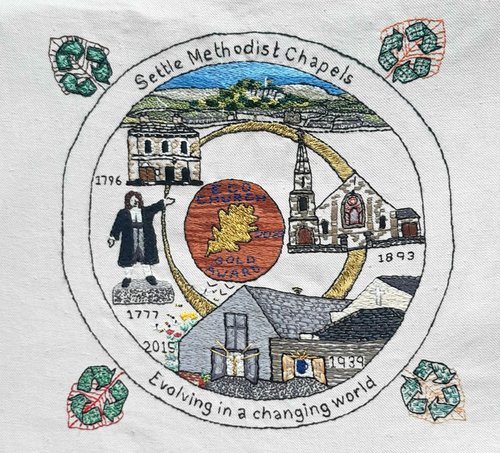“In our Silver award application, we put we did not have any land. The A Rocha UK team Google Earthed our plot, noticed an unused patch of tarmacked earth and told us we did have land and we should do something about it,” remembers Philip Taylor, the senior steward and leader of the church eco-team.
The team worked hard to transform the land into an eco-garden, a community space with ‘Bug-ingham Palace’ shed, flower beds planted by local children, a greenhouse, bird feeders, a hedgehog house and a bird house.
Lowering the building’s carbon emissions was easier for St John’s Church compared to many other Methodist buildings. The congregation had sold their historic church back in 2015 and moved to a more recent one dating from the 1930s. This church was easier to improve and with newly installed underfloor heating and solar panels, the sanctuary is a permanently warm space.
While the sanctuary is well insulated, it was not the case for the other rooms of the church so, not long before the pandemic, they insulated the roof and added cladding outside. “It was very expensive but worth it and helped get the Silver award,” adds Philip.
When Revd Tim Broughton, the current minister arrived in the circuit in 2018, the congregation welcomed his interest in the climate enthusiastically: “We began celebrating the creation times, with a series preaching around Creationtide and then we celebrated Earth Day.”
Along With Philip, the senior steward, they brought together a team of eco-champions to look at what else could be achieved: “We found people from all walks of life keen to help. We have a farmer, our treasurer is an eco-warrior, two engineers, whose main interest is in energy and decarbonisation, and a botanist.”
Judith Allison is a retired botanist and a member of Green Christian who did a plant survey of the area, “Every church should go for an award, many churches would probably find they are already doing enough to begin their journey with a bronze award.”

Stepping up for the Gold award
To receive their gold award, St John’s Church had to improve their community engagement and their land. They organised a big event called Let's Talk Rubbish about recycling, people were very engaged notably by the North Yorkshire Rotters, a group of volunteers who inspire people to change their waste habits. Last September, the theme was Let's Talk Local with displays and stalls showcasing local suppliers and producers. The next talk, Let’s Talk Muck will be about farming.
Revd Tim Broughton is keen to involve the local farmers, “One of the things we're trying to do is help amplify the voice of our farming community. I'm part of the rural action team and of the Climate Action Committee in the district; and reconciling those two things isn't always an easy path! Let’s Talk Muck is our way of saying let's give farmers and our farming community a voice.”
The team engaged with the local community, registered their circuit to become an eco-circuit and created the environmental policy. They are hoping to be invited to share their story and good practice with other churches.
Despite not having any children in their congregation currently, they decided to work with the local school on developing a green garden. “We invited them to become involved in the planning, did some planting and we held a competition to decorate the shed – now known as Bug-Ingham Palace,” says Philip.
“We also run an after-school eco-explorers group. We do so many activities but the most successful is going for a walk to talk about wildlife,” adds Judith. “It’s for children between four and 11, so one challenge we have to face is to keep young people interested.”

What’s next?
The church’s Lent calendar offers ideas to encourage the congregation to change their habits and to become more eco-friendly. At the entrance of the church, there is a big bell jar where people can post a slip of paper with their eco deed of the week.
They have recently finished their contribution to a tapestry exhibition that will soon take place at High House Chapel in Weardale Museum. The tapestry celebrates their church’s journey towards Net Zero.
The eco-team is currently looking to get funding to install more solar panels and join a local energy initiative whose aim is to get many people generating electricity so electricity can be produced and distributed locally.